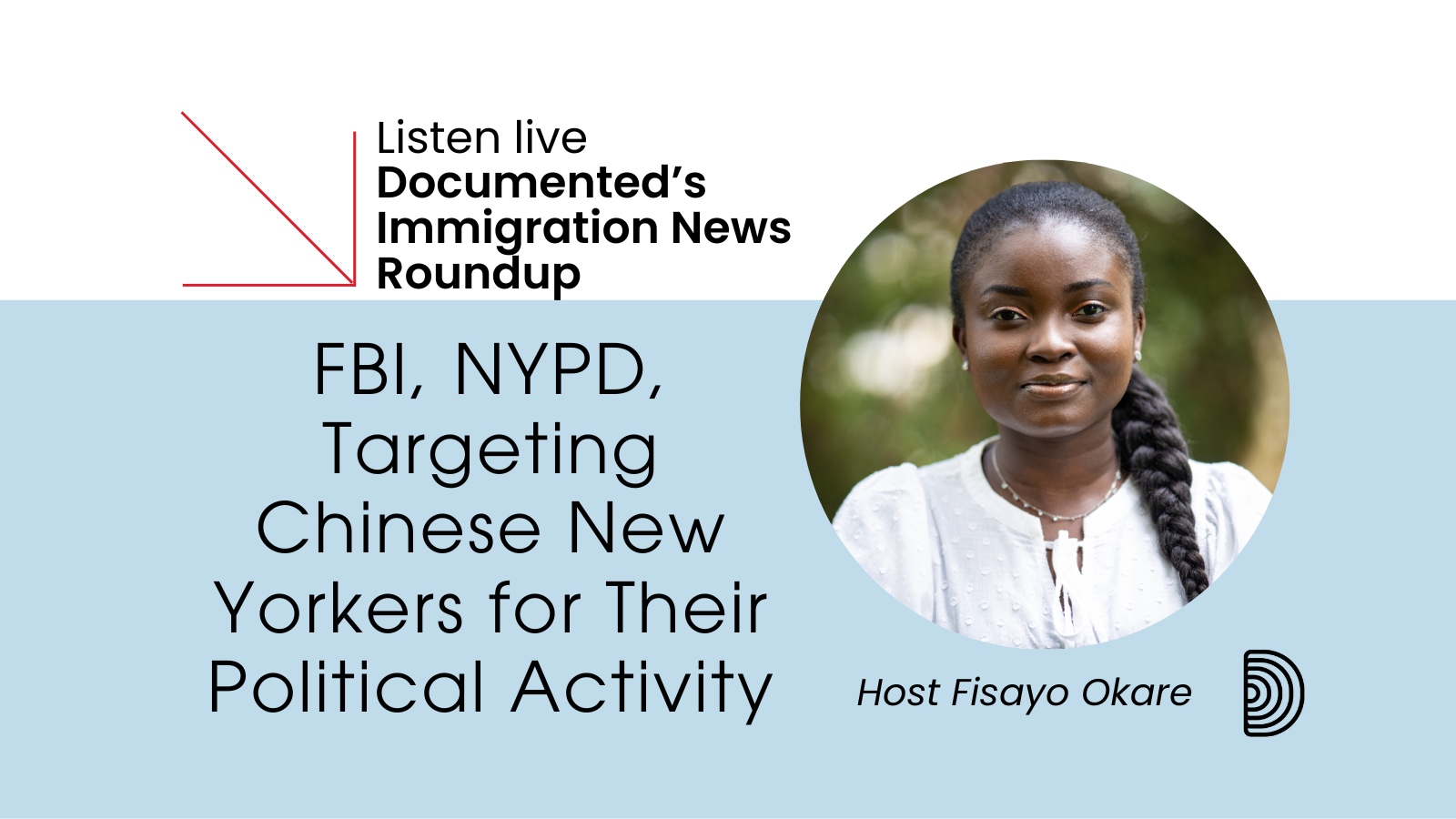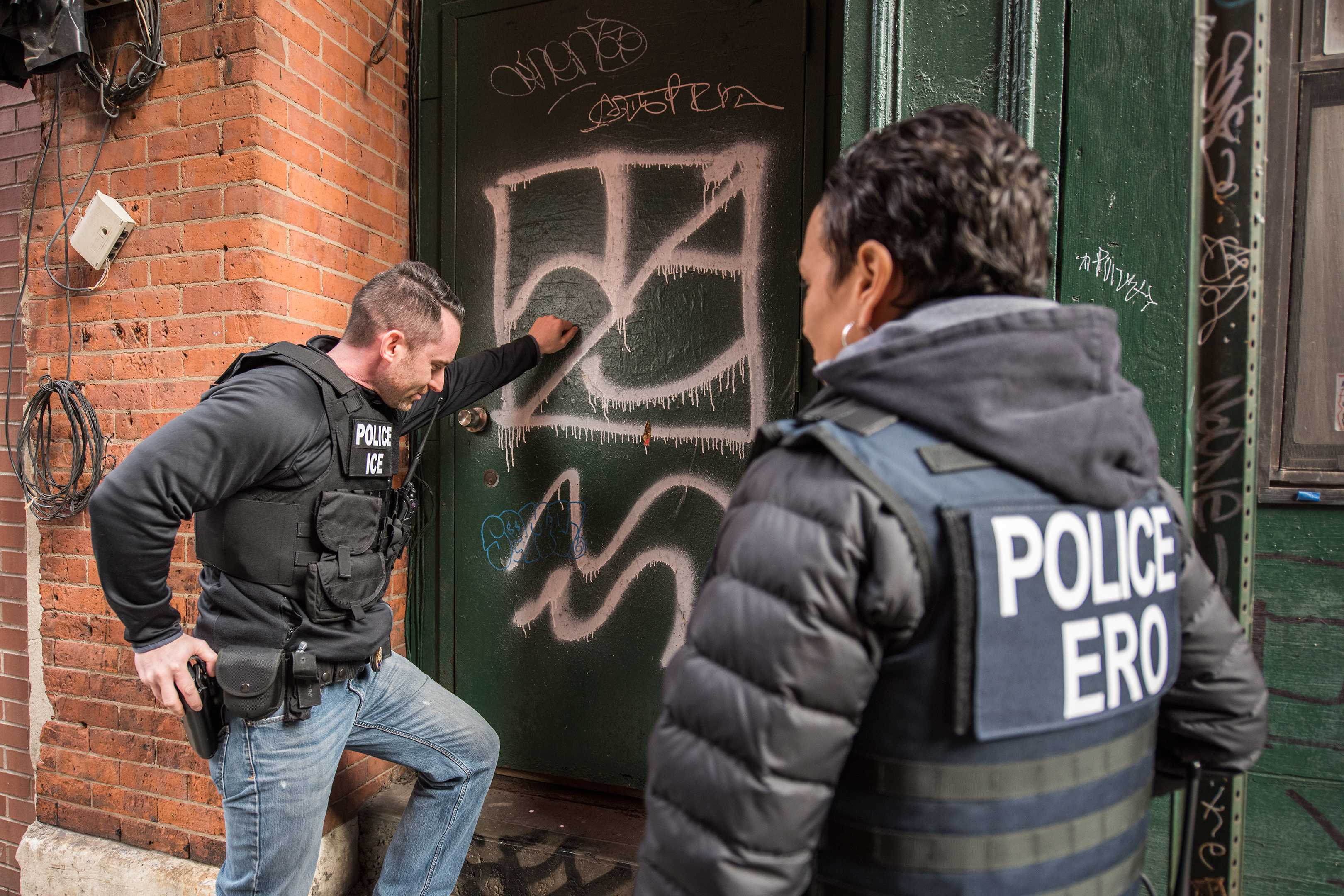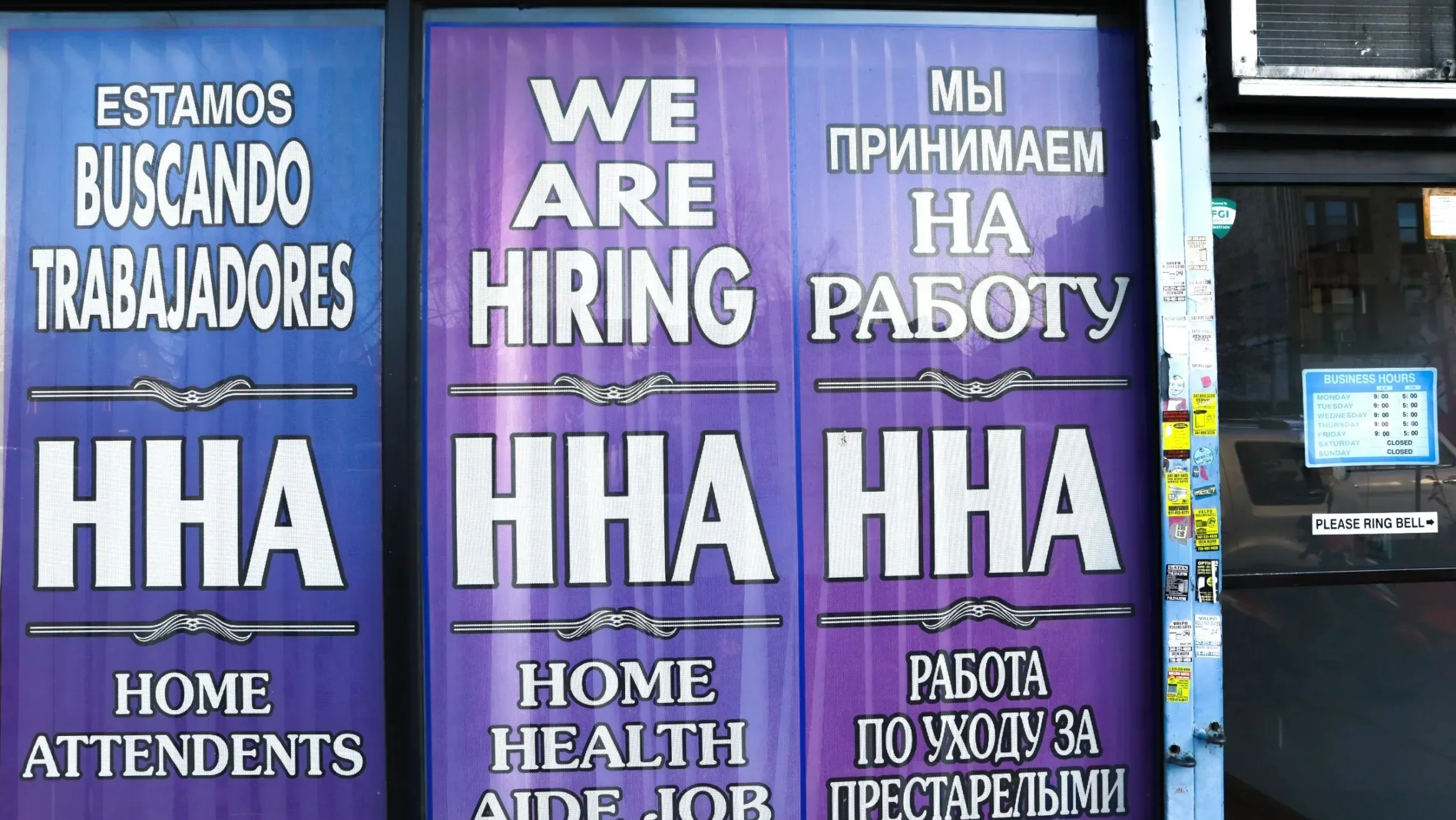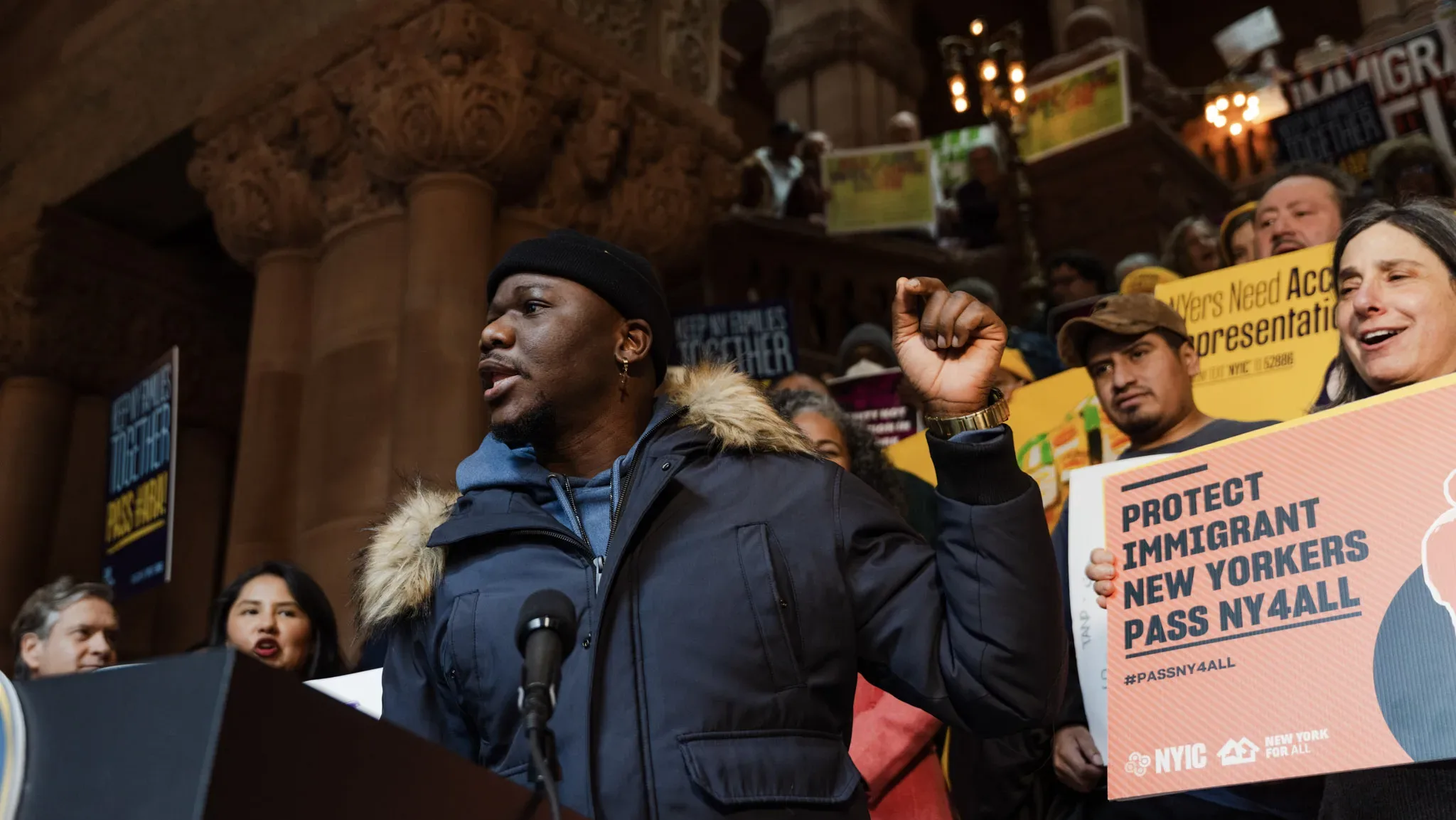In Manhattan’s Chinatown, rumors about FBI informants are circulating, and cases of Chinese immigrants being targeted by scammers impersonating FBI agents are increasing — writes investigative journalist Rong Xiaoqing.
Her latest report delves into how Chinese Americans are being targeted for their political activity. Xiaoqing — whose story was published for this year’s Isaac Rauch Fellowship at Documented — unpacks the report with show host Fisayo Okare.
Also mentioned in today’s episode, what you need to know in immigration news this week:
- NYC unlocks $107 million in federal migrant aid after months of paperwork delays — NY Daily News
- Supreme Court Justice Samuel Alito extends the pause of a Texas state immigration law that would allow the state to arrest migrants — CBS News
Documented’s Immigration News Roundup is hosted on WBAI Radio in New York City. The voiceover of the news briefing segment is by Documented’s Amir Khafagy. The show’s theme song is by Jingle Punks. Show host Fisayo Okare asked investigative reporter Rong Xiaoqing to choose a song to end the show and to tell us why she chose it. Today’s episode ends with a feature song — Lo Ta-Yu’s “Tomorrow will be better,” which can be heard on the radio version of the show on WBAI.
Fisayo: Hello, you’re listening to Documented, the radio show where we bring you the latest in immigration news. I’m your host, Fisayo Okare, and in today’s episode, we have an important investigation from Documented about how Chinese immigrants in New York City’s Chinatowns have been caught in the political crossfires between the U.S. and China and are being targeted by both the Chinese Communist Party and U. S. agencies such as the FBI and NYPD for their political activity.
Rong: The FBI arrested some people in the Chinese community accusing them of helping China to collect information, but the FBI won’t tell you whether you’re a witness or you’re the target.
Fisayo: But before we go into that story, I’m joined by my colleague Amir Khafagy. Amir, please go ahead and give us the news updates from this week’s Immigration News.
Amir: Thank you, Fisayo. President Biden’s team gave the Federal Emergency Management Agency, otherwise known as FEMA, the green light to release nearly $107 million in aid for migrants in New York City.
This decision came after Mayor Adams office finally submitted all the necessary paperwork last week, following months of delays. The aid, which has sat untouched since Congress first allocated it last summer, is now authorized for distribution to the city, White House and City Hall officials have confirmed. The Adams administration, while providing the federal government with required budget documents, requested a waiver to relax a cap on how much money can be used on hotel costs.
FEMA, which is responsible for managing this aid program, officially approved the waiver last Friday afternoon, which paves the way for the city to receive the full aid.
Initially, only 10% of the aid allocated for the city could be used for housing migrants in hotels. However, FEMA agreed to increase this to 15% in response to the waiver request from the Adams administration.
Earlier this week, Justice Samuel Alito extended the pause of a Texas state immigration law that would allow the state to arrest migrants. There’s a new battle under a controversial Texas state law known as SB 4. Hundreds of people protested at the state capitol in Austin this week that the law should not go into effect.
The law, SB4, aims to give Texas state troopers, police, and law enforcement agencies the authority to arrest, jail and prosecute migrants suspected of crossing the southern border into the U. S. without authorization.
Back to you, Fisayo, for today’s feature story.
Fisayo: Thank you so much for the news briefing, Amir. Up next, our main story of today.
In Manhattan’s Chinatown, rumors about FBI informants are circulating and cases of Chinese immigrants being targeted by scammers impersonating FBI agents are increasing. First, let’s set some historical background context to today’s story so we can understand better.
New York City is among the cities with the biggest Chinese community in the U.S. There are three major Chinatowns in New York City, Manhattan, Flushing in Queens, and Sunset Park in Brooklyn. The population of Chinese New Yorkers is slightly below half a million people according to 2020 data from the U. S. Census Bureau. Chain migration is a big factor influencing the movement of Chinese people to the city.
The education system draws younger Chinese to study in the U.S. Many end up staying and building on the Chinese community here. Some people come for blue collar jobs too. The economics of the job market here still makes sense for Chinese or other diasporas to come. There are jobs paying better than in China, for example.
There are also business opportunities and so other Chinese people invest in real estate here too. Since 2018, the relationship between the U. S. and China has fallen to a historic low since the two countries resumed their relationship in 1979, after a 30 year freeze when the Chinese Communist Party took over China.
The friction in the relationship between the U. S. and China started with former President Donald Trump’s trade war against China.
Former President Donald Trump [PBS NewsHour]: As President of the United States, today I’m directing the United States trade representative to examine China’s policies, practices, and actions with regard to the theft of American intellectual property.
Fisayo: The U. S. accused China of intellectual property. The accusation was met with vehement pushback from Chinese president Xi Jinping.
President Xi Jinping [C-SPAN]: A healthy, stable, and growing China U.S. relationship is not only in the fundamental interest of the Chinese and American people, it also meets the expectations of the international community. For China and the United States, win-win cooperation is the only right choice. And the pathway toward a better future.
Fisayo: Both countries then proceeded to intensify the operations against influence and espionage activities from the other. As a result, Chinese immigrants on both ends of the political spectrum have been haunted by government agents in China and the United States. Their political activity is now cast under a magnifying glass and is causing repercussions for them and their families.
Paranoia and fear are spreading in New York City’s Chinese communities right now. Rong Xiaoqin, the investigative journalist behind this new report, will join us in a moment to discuss it.
Here’s an excerpt from the investigative report, which is how the story begins.
When she’s not serving customers at her store, Yibing Wang ruminates about how she came to cross paths with the FBI. What’s your relationship with the Chinese consulate in New York? Why did you help the consulate? What did the consulate give you in return? Do you oppose Taiwan’s independence? Too nervous to take a look at the badges they flashed, Yibing did her best to answer their questions.
But she began worrying they could be scammers after they left. Now, I know they are real FBI agents, Yibing Wang said.
Rong, the writer of this investigation, is a New York based journalist and an Isaac Rauch Fellow for Documented. She writes for various English and Chinese language publications. Her articles have appeared in Foreign Policy, The New York Times, among other media outlets. She joins us now.
Fisayo: The character that begins your story, Yibin Wang. Her experience really brings us into the story in a very intriguing way. And my first question is, how did you find Yibing, the lead character of your story?
Rong: She is quite active in the Chinese community. She has her own organization and she hosts some community events. So a lot of people in the community know her. So when the three people from the FBI visited her in January last year, she actually told some people and she actually went to the local New York police precinct afterwards, accompanied by some other community people, because she thought that those three agents might be scammers.
But the police precinct didn’t take the case because she didn’t really lose any material things. But then, she talked to some Chinese papers about that experience. So there were some stories about that visit and her reporting to the police precinct. But of course, there was no detail like what really happened. It was only like she suspected some scammers were targeting her. So I just went to her shop and talked to her.
Fisayo: And so Yibing is one of many Chinese nationals outside China who are against Taiwan independence. And as you mentioned in your report, this isn’t unusual at all, like for many people that are born in China. And as such, they support the Communist Party. As you highlighted in your report, like Yibin, a dozen or so other Chinese community leaders have been approached by the FBI in the past year. Can you tell us more about how and why Chinese community leaders are being approached by the FBI?
Rong: The FBI when they came to talk to you, there normally were a few reasons. One, they probably are taking you as a witness for some case that they have been investigating. Or, they’re trying to turn you into an informant to get information from you, or you’re their target of their investigation.
But the FBI won’t tell you when they come to you. They won’t tell you whether you’re a witness or you’re the target. So in the past few years, there were a few cases where the FBI arrested some people in the Chinese community, accusing them of helping China to collect information. So we don’t know whether these community leaders who were interviewed by the FBI, but not arrested whether they are, they are witnesses in any of these cases, or if there are any other groups the FBI wanted to approach.
And about this “a dozen community leaders” who were interviewed by the FBI, the FBI won’t give us this information; they declined to provide any details. But I did hear, not only from Yibing, but also heard the same from some other community leaders who said, yeah, they basically put the figure as about 10 to 12 or something like that.
Fisayo: Wow. Okay. And so on one hand, some Chinese community leaders who are in support of China’s Communist Party are being approached by the FBI. And on the other hand, Chinese dissidents living in the U. S. who have been calling attention to China’s human rights abuses are being approached by Chinese residents in the U.S. who are under control of the Chinese Communist Party. And, as you mentioned in your report as well, human rights organizations say China’s repression of overseas dissidents has only been growing in recent years. Can you highlight instances where dissidents have been approached and what you understand by why this is happening?
Rong: I think a typical example is the George Washington University, when students formed that independent student union. Some students who were suspected of getting involved in that union. What I heard is that their families in China were approached by the police. So the person I quoted in the story he’s not the only one, there were others.
But he probably is the only one who would like to talk about this on the record. The reason why this happened, I think this particular incident, this organization caught the attention of police or national security people in China was because of their manifesto. In their manifesto, they claimed that the CCP is not their legal representative.
And then afterwards, some overseas media outlets — these are mainly Chinese media outlets — were saying that this is the first, first overseas gunshot against totalitarian control of the CCP in China. So that probably, it sounds very serious to the national security people in China first
Fisayo: First overseas gunshot?
Rong: Meaning: the first group of people who stood up and announced that they’re against the CCP.
Fisayo: Hmm. Okay. Okay. And so that’s the first group of people —so that’s the students’ organization in Georgetown University in Washington, D.C. — that are publicly saying that they’re against the CCP.
Rong: Yeah. They put that in their manifesto, which they posted on social media. But this organization, as far as I know, is not very active afterwards. They just posted that, that manifesto and then maybe because of the crackdown in China — interrogations with their family members. These students were quite scared. So, they kind of like ceased all activities.
Fisayo: And so, Jinrui Zhang the student in Georgetown University, who you quoted in the story, are they part of the organization or are they just said something about it on their social media, and then they were targeted, as well as their family back in China?
Rong: Jinrui Zhang, he told me that he was not involved. But he is a pro-democracy person, and he has talked about China’s measures during COVID, he’s against the strict measures and he has been talking about democracy, China should improve, or should get democracy or offer democracy to its people. He did talk about that publicly before, but he said he was not involved in this student union at all. But he suspects some students reported him because of his political stance, and they suspected that he was part of this organization, so they reported him.
Fisayo: Wow. And so as a result of what happened, and even the police approaching his family in China, he’s had to be extra cautious about communicating with his family back home — because I remember in the story where his sister indicated one time that he should have their conversation via zoom instead, right?
Rong: Yeah, when I asked him, why did he want to talk on the record with his real name, I asked him whether he worried that it would get more repercussions for his family members in China — he said what they suspected he has done, that already happened. They have already suspected that. So he had nothing else that’s in secret that they would like to get out of him or his family members.
Fisayo: Hmm. There’s also another character in your story, Angwang, whose experience is also particularly intriguing, and sad, I must say.
So Angwang is an officer with the New York Police Department who was fired in January. When I read his experience in your report, it was particularly disturbing. Can you tell us briefly about his story and how you found out about it? What was it like speaking to him for your investigative report? And, what Anwang’s case or experience represents in your investigative report?
Rong: Angwang’s story, since he was arrested, that arresting itself and then afterwards, when his charges were dropped — those were all covered by the mainstream media.
I think no media outlet so far dived into the details of what really happened. That’s what our story provides. Also, I think, so far, there has been no other media outlet reporting that he has gotten fired.
By talking to him, I feel like he represents a group of the people who believe in freedom of speech, believe in equality in this country, and then who also see their dreams and their beliefs smashed by their own experience.
And I mean, this is not unusual because a lot of immigrants come to the U.S. with an image of a perfect country in their mind and their understanding of freedom of speech often means they can say whatever they like, no matter whether it, you know, their beliefs are aligned with some unpopular beliefs or even aligned with an adversary
kind of nation’s government or something. But then when you think about this, whether you’re really able to express the politically unpopular beliefs in this country, that’s not… I think the answer is not firm. It depends on the environment and it depends on the historical times
Fisayo: The Deputy Consul General of the Chinese consulate in New York, Jin Qian, what did he say when asked about involvement in China’s alleged manipulation of Chinese immigrants in the U. S.? What did he say about the consulate’s involvement in it?
Rong: Yeah. Jin Qian, the deputy counselor of China’s consulate in New York. I didn’t speak to him, per se. I communicated with him via emails. I gave him a list of questions he sent back a quite long response, but it’s not like he answered the questions one by one.
He basically presented the stance of China or the Chinese government and emphasized that they observed all relevant laws when they’re encountering Chinese immigrants.
Fisayo: Okay. And Yinbing Wang, the person at the beginning of your story, how is she doing today? And how has being on the FBI blacklist impacted her daily life today?
Rong: Well, I see like she is recovering now. She went to some community events again. For a long time, she just stayed at her own place and went from an active person to like a very low profile scared person. But now she’s recovering. But, she got into a car accident last October.
I think her nerves were affected, so she couldn’t sleep well, and she got a lot of nightmares. So she is still struggling with that. But the car accident was not directly related to the FBI’s interviews or something. But because of her mind being affected, she’s kind of like distracted, you know…
Fisayo: Paranoid?
Rong: Yeah, and then because she’s distracted by all these things and all this stress and pressure she probably somehow got that car accident. That’s also possible.
Fisayo: Was she driving?
Rong: She was driving. She was also hit by a school bus.
Fisayo: Hmmm. Were there other factors — you know, I know, you know, for an investigative story like this one, there were indeed a lot of sources to speak to — but were there other factors that further stretched the turnaround time?
Rong: I think the major challenge I encountered was this is a very sensitive topic. Most people just don’t want to talk about it. Yibing probably was the only one that I talked to who would like to talk on record with her real name about the encounter with the FBI. And Jinrui Zhang was the only one who would like to talk about the CCP’s harassment of their family members among all Chinese international students. I talked to a lot, you know, some of them were students who were literally shaking when they talked about this. I also talked to the Chinese community figures regarding the FBI’s surveillance on them.There was a person whom I’ve known for a long time, and when I talked to her — this was totally off the record, we agreed it’s off the record, I’m not going to quote him with his name or anything — he still said, “you know, now you sit in front of me, I don’t know whether you carried a tape recorder and whether you’re going to hand to the FBI afterwards.”
Fisayo: Wow.
Rong: So that’s how scared people are now.
Fisayo: Wow.
Fisayo: And what was the most surprising part of the story for you?
Rong: Surprising part? Surprising. I, I don’t know. I think, I think, well, Angwang indeed surprised me. Because now, he spends a lot of time studying the civil cases or the charges against Chinese community figures or the scientists. And he attended a lot of civil rights events. And so, he’s kind of turned himself into a civil rights activist.
So I think a reaction like this surprised me because I thought people in that situation would want to stay away from all of this, would want to, would want this chapter to be flipped over as quickly as it could be. But he turned himself into a fighter. I think that’s quite something.
Fisayo: That’s very interesting. Yeah, that’s also something I would have expected to result from his interaction with the FBI.
What he experienced with the FBI coming to his home and handcuffing him in front of his wife and two year old daughter — at his home on Long Island — was also, I think, the most surprising part of the story for me, because it was a very, very intense experience.
Rong: That, that is true. I guess, I didn’t put that out as a surprise because I actually asked him about that. Why did they do such a big show in front of your house?
He explained that, that was a time when — I think that was during the the election or something — he was kind of like saying they were asked to make this show, to make it an eye-catcher for the media because they wanted the public to see that they are catching a bad guy or a suspected spy for China.
Fisayo: That’s crazy. What would you want the major takeaway for readers to be — especially for readers of a publication like Documented who are mostly immigrants, advocates, social workers, and immigration lawyers?
Rong: I think China and the U. S. relation, and all of the major things have been fully covered by the mainstream media here.
And a lot of American people, when they think about China and the U.S., they always think about Xi Jinping, President Biden, or even President Trump. They think about trade wars, they think about Huawei, TikTok. But it was indeed these people living in the Chinatowns — the ordinary people — who are shouldering the consequences of the decisions made by the decision makers or the important figures.
So, how would this relationship affect these ordinary people? I think that we should pay more attention to this.
Another thing is I want the American public to know that the Chinese community is not a monolith. You see, like in this story, people are on different sides of the political spectrum. Some support the CCP or some feel a strong connection with China, but others are pushing democracy in China.
So, I want American people to know that you can’t simplify this whole entire community or label this community.
Fisayo: That’s a very, very important point. Thank you so much. Thank you so much, Ron, for speaking with me and for highlighting all the answers I gave to all the questions that I asked. Is there anything that I didn’t ask you about that you’d want to highlight further or are we good?
Rong: No, but I just want to mention one thing. I think the editors, Max and Clarissa…
Fisayo: Oh, yes!
Rong: They have actually done a great job. Because, you know, I am an insider of the Chinese community. They are not the insiders. So,when I write about a story, there are some things that I just assume everybody should understand. Some points I made because of my insider knowledge, so I thought everybody should understand.
They as outsiders often find “This point is confusing. That point is confusing.” So, we went back and forth many, many rounds. And eventually we presented a final final story that I think both people in the Chinese community and the broader society would understand and resonate with.
Fisayo: That’s good. That’s good. And was there any reason that — you could have chosen to publish this story or work on this story with any other publication. Was there any reason that you chose documented in particular?
I know that we put out a call out for the Isaac Rauch fellowship for applicants to submit story ideas, and that was the start of working on this story in the first place, but you could have still chosen any other publication to work with to publish this story, given you’ve been working in New York and, you know, been a journalist for many years.
And so why, why Documented?
Rong: I feel Documented understands immigrant communities. So for a story like that, I have to spend a lot of time and energy to do it, I really wanted to put it in, put it in, in good hands, good hands who could understand it.
Fisayo: Good. Nice. Okay. Thank you. Thank you. Thank you so much.
Rong: Sure. Thank you.
Fisayo: We’re going to end today’s show with a song called Tomorrow Will Be Better. I asked our investigative reporter Rong Xiaoqing to choose a song for today’s show and tell us why she chose it. So she chose this.
Tomorrow Will Be Better was written by Taiwan musician Lo Ta-Yu in 1985. and originally sung by more than 60 singers and is still a household melody in china inspired by the English charity single “We are the World,” Rong tells me the lyrics say that there’s still hunger and war in the world, but let’s hope tomorrow will be better — an optimism that we need more than ever in today’s world, which is scarred by war and geopolitical battles.
Lo Ta-Yu & others: [Music Plays]
Fisayo: You’ve been listening to Documented’s Immigration News Roundup. I’m your host, Fisayo Okare, and to see today’s show’s transcript, which includes the lead story of today’s show, you can go to www.docu.nyc/ep8. Until next time, thank you for listening.














